Ares
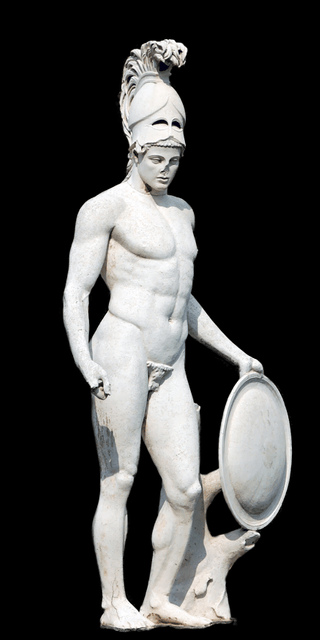
Ares

| Ares | |
|---|---|
| Abode | Mount Olympus,Thrace,Macedonia,Thebes,Sparta&Mani |
| Symbols | Sword,spear,shield,helmet,chariot,flaming torch,dog,boar,vulture |
| Personal information | |
| Consort | Aphroditeandvarious others |
| Children | Erotes(ErosandAnteros),Phobos,Deimos,Phlegyas,Harmonia,Enyalios,Thrax,Oenomaus,AmazonsandAdrestia |
| Parents | ZeusandHera |
| Siblings | Aeacus,Angelos,Aphrodite,Apollo,Artemis,Athena,Dionysus,Eileithyia,Enyo,Eris,Ersa,Hebe,Helen of Troy,Hephaestus,Heracles,Hermes,Minos,Pandia,Persephone,Perseus,Rhadamanthus, theGraces, theHorae, theLitae, theMuses, theMoirai |
| Roman equivalent | Mars |
| Norse equivalent | Týr |
| Hinduism equivalent | Kartikeya |
Ares (/ˈɛəriːz/; Ancient Greek: Ἄρης, Áres [árɛːs]) is the Greek god of war. He is one of the Twelve Olympians, the son of Zeus and Hera.[6] In Greek literature, he often represents the physical or violent and untamed aspect of war, in contrast to his sister, the armored Athena, whose functions as a goddess of intelligence include military strategy and generalship.[7]
The Greeks were ambivalent toward Ares: although he embodied the physical valor necessary for success in war, he was a dangerous force, "overwhelming, insatiable in battle, destructive, and man-slaughtering."[8] His sons Phobos (Fear) and Deimos (Terror) and his lover, or sister, Enyo (Discord) accompanied him on his war chariot.[9] In the Iliad, his father Zeus tells him that he is the god most hateful to him.[10]%205.890%E2%80%93891.]]An association with Ares endows places and objects with a savage, dangerous, or militarized quality.[[11]](https://openlibrary.org/search?q=Hansen%2C%20 [[CITE|11|https://openlibrary.org/search?q=Hansen%2C%20Classical%20Mythology%2C%20pp.%20114%E2%80%93115.)Trojan War side, while Athena, often depicted in Greek art as holding Nike (Victory) in her hand, favoured the triumphant Greeks.[8]
Ares plays a relatively limited role in Greek mythology as represented in literary narratives, though his numerous love affairs and abundant offspring are often alluded to.[12] When Ares does appear in myths, he typically faces humiliation.[13] He is well known as the lover of Aphrodite, the goddess of love, who was married to Hephaestus, god of craftsmanship.[14] The most famous story related to Ares and Aphrodite shows them exposed to ridicule through the wronged husband's device.[15]
The counterpart of Ares among the Roman gods is Mars,[16] who as a father of the Roman people was given a more important and dignified place in ancient Roman religion as a guardian deity. During the Hellenization of Latin literature, the myths of Ares were reinterpreted by Roman writers under the name of Mars. Greek writers under Roman rule also recorded cult practices and beliefs pertaining to Mars under the name of Ares. Thus in the classical tradition of later Western art and literature, the mythology of the two figures later became virtually indistinguishable.
| Ares | |
|---|---|
| Abode | Mount Olympus,Thrace,Macedonia,Thebes,Sparta&Mani |
| Symbols | Sword,spear,shield,helmet,chariot,flaming torch,dog,boar,vulture |
| Personal information | |
| Consort | Aphroditeandvarious others |
| Children | Erotes(ErosandAnteros),Phobos,Deimos,Phlegyas,Harmonia,Enyalios,Thrax,Oenomaus,AmazonsandAdrestia |
| Parents | ZeusandHera |
| Siblings | Aeacus,Angelos,Aphrodite,Apollo,Artemis,Athena,Dionysus,Eileithyia,Enyo,Eris,Ersa,Hebe,Helen of Troy,Hephaestus,Heracles,Hermes,Minos,Pandia,Persephone,Perseus,Rhadamanthus, theGraces, theHorae, theLitae, theMuses, theMoirai |
| Roman equivalent | Mars |
| Norse equivalent | Týr |
| Hinduism equivalent | Kartikeya |
Names
The etymology of the name Ares is traditionally connected with the Greek word ἀρή (arē), the Ionic form of the Doric ἀρά (ara), "bane, ruin, curse, imprecation".[17][18]ra/) There may also be a connection with the Roman god of war, Mars, via hypothetical Proto-Indo-European *M̥rēs; compare Ancient Greek μάρναμαι (marnamai), "I fight, I battle".[19] Walter Burkert notes that "Ares is apparently an ancient abstract noun meaning throng of battle, war."[20] R. S. P. Beekes has suggested a Pre-Greek origin of the name.[21]
The adjectival epithet, Areios, was frequently appended to the names of other gods when they took on a warrior aspect or became involved in warfare: Zeus Areios, Athena Areia, even Aphrodite Areia. In the Iliad, the word ares is used as a common noun synonymous with "battle."[8]
Inscriptions as early as Mycenaean times, and continuing into the Classical period, attest to Enyalios as another name for the god of war.[1]
Character, origins, and worship
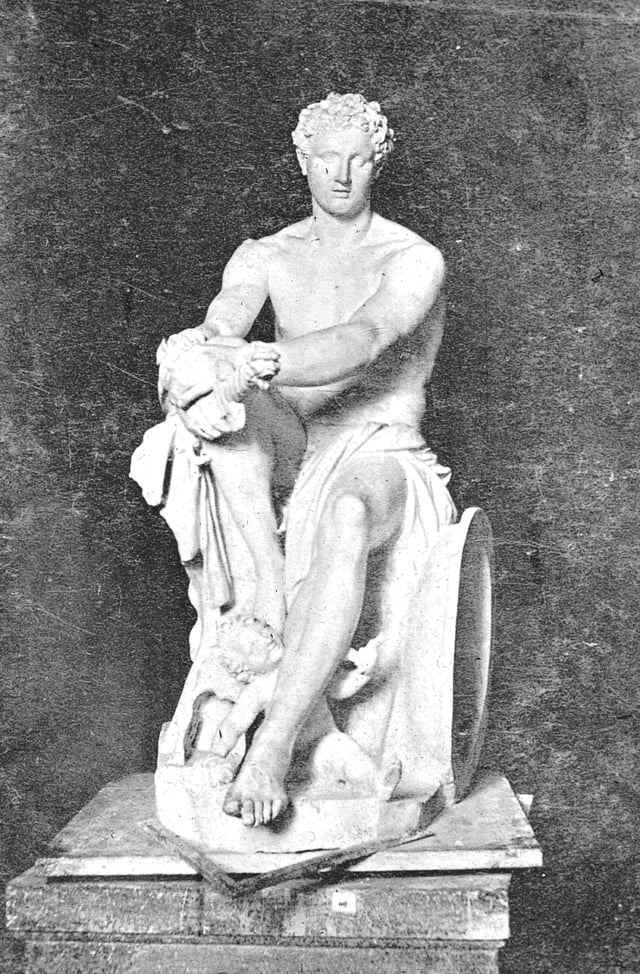
Vatican, Rome, Italy. Statue of Ares, Scopas's influence. Brooklyn Museum Archives, Goodyear Archival Collection
Ares was one of the Twelve Olympians in the archaic tradition represented by the Iliad and Odyssey. Zeus expresses a recurring Greek revulsion toward the god when Ares returns wounded and complaining from the battlefield at Troy:
Then looking at him darkly Zeus who gathers the clouds spoke to him:"Do not sit beside me and whine, you double-faced liar.To
me you are the most hateful of all gods who hold Olympus.Forever quarrelling
is dear to your heart, wars and battles....And yet I will not long endure to see you in pain, sinceyou are my child, and it was to me that your mother bore you.But were you
born of some other god and proved so ruinouslong since you would have been dropped beneath the gods of the bright sky."[27]
A late-6th-century BC funerary inscription from Attica emphasizes the consequences of coming under Ares's sway:
Stay and mourn at the tomb of dead KroisosWhom raging Ares destroyed one day, fighting in the foremost ranks.[29]
Ares in Sparta
In Sparta, Ares was viewed as a model soldier: his resilience, physical strength, and military intelligence were unrivaled. An ancient statue, representing the god in chains, suggests that the martial spirit and victory were to be kept in the city of Sparta. That the Spartans admired him is indicative of the cultural divisions that existed between themselves and other Greeks, especially the Athenians (see Pelopponesian War).
Ares in the Arabian Peninsula
Ares was also worshipped by the inhabitants of Tylos. It is not known if he was worshipped in the form of an Arabian god (or which one) or if he was worshipped in his Greek form.[30]
Ares in the Scythians
According to Herodotus' Histories, the Scythians worshipped a god he equated with the Greek Ares; unlike most other Scythian gods, he does not offer the indigenous name for this deity. While ranking beneath Tabiti, Api and Papaios in the divine hierarchy, this god was apparently worshipped differently from other Scythian gods, with statues and complex altars devoted to him. This type of worship is noted to be present among the Alans.[31]
Noting how Greek mythological Amazons are devotees of Ares and most likely based on Scythian warriors, some researchers have considered the possibility that a Scythian warrior women cult of this deity existed.[32] Others have also posited that the "Sword of Mars" alludes to the Huns having adopted this deity.[33]
Attributes
Cult and ritual
Although Ares received occasional sacrifice from armies going to war, the god had a formal temple and cult at only a few sites.[35] At Sparta, however, each company of youths sacrificed a puppy to Enyalios before engaging in ritual fighting at the Phoebaeum.[3] The chthonic night-time sacrifice of a dog to Enyalios became assimilated to the cult of Ares.[37]
Just east of Sparta stood an archaic statue of Ares in chains, to show that the spirit of war and victory was to be kept in the city.[4]
The Temple of Ares in the agora of Athens, which Pausanias saw in the second century AD, had been moved and rededicated there during the time of Augustus. Essentially, it was a Roman temple to the Augustan Mars Ultor.[35] From archaic times, the Areopagus, the "mount of Ares" at some distance from the Acropolis, was a site of trials. Paul the Apostle later preached about Christianity there. Its connection with Ares, perhaps based on a false etymology, is etiological myth. A second temple to Ares has been located at the archaeological site of Metropolis in what is now Western Turkey.[39]
Attendants
Deimos ("Terror" or "Dread"), and Phobos ("Fear"), are his companions in war.[40] According to Hesiod, they were also his children, born to him by Aphrodite.[41] Eris, the goddess of discord, or Enyo, the goddess of war, bloodshed, and violence, was considered the sister[42] and companion of the violent Ares. In at least one tradition, Enyalius, rather than another name for Ares, was his son by Enyo.[43]
Ares may also be accompanied by Kydoimos, the demon of the din of battle; the Makhai ("Battles"); the "Hysminai" ("Acts of manslaughter"); Polemos, a minor spirit of war, or only an epithet of Ares, since it has no specific dominion; and Polemos's daughter, Alala, the goddess or personification of the Greek war-cry, whose name Ares uses as his own war-cry. Ares's sister Hebe ("Youth") also draws baths for him.
According to Pausanias, local inhabitants of Therapne, Sparta, recognized Thero, "feral, savage," as a nurse of Ares.[44]
Consorts and children
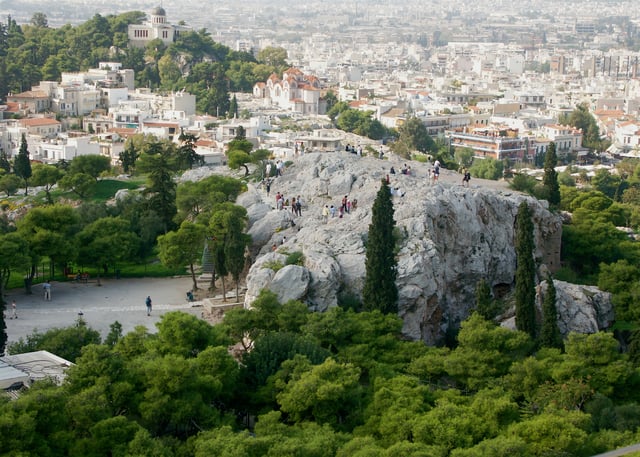
The Areopagus as viewed from the Acropolis.
The union of Ares and Aphrodite created the gods Eros, Anteros, Phobos, Deimos, Harmonia, and Adrestia. While Eros's and Anteros's godly stations favored their mother, Adrestia preferred to emulate her father, often accompanying him to war.[45] Other versions include Alcippe as one of his daughters.
Upon one occasion, Ares incurred the anger of Poseidon by slaying his son, Halirrhothius, because he had raped Alcippe, a daughter of the war-god. For this deed, Poseidon summoned Ares to appear before the tribunal of the Olympic gods, which was held upon a hill in Athens. Ares was acquitted. This event is supposed to have given rise to the name Areopagus (or Hill of Ares), which afterward became famous as the site of a court of justice.[46]
Accounts tell of Cycnus (Κύκνος) of Macedonia, a son of Ares who was so murderous that he tried to build a temple with the skulls and the bones of travellers. Heracles slaughtered this abominable monstrosity, engendering the wrath of Ares, whom the hero wounded in conflict.[47]
List of Ares's consorts and children
| Divine Consorts | Children | Mortal Consorts | Children |
|---|---|---|---|
| Aphrodite | •Phobos | Aerope | • Aeropus |
| •Deimos | Aglauros | •Alcippe | |
| •Harmonia[48] | Althaea | •Meleager(possibly) | |
| •Adrestia | Anchiroe | •Sithon(possibly) | |
| •Eros(part of theErotes) | Astynome | •Diocles | |
| •Anteros(part of theErotes) | Astyoche, daughter ofActor | •Ascalaphus | |
| •Himeros(part of theErotes) | •Ialmenus | ||
| •Pothos(part of theErotes) | Atalanta• | •Parthenopaeus(possibly) | |
| Calliope(Muse) | •Edonus(possibly) | Caldene, daughter of Pisidus | •Solymus(possibly) |
| •Mygdon | Chryseor | •Phlegyas | |
| • Odomantus (possibly) | Dotis | ||
| •Biston(possibly) | Critobule | • Pangaeus[49] | |
| Terpsichore(Muse) | Demonice | •Euenus | |
| Eos | *no offspring mentioned | •Molus | |
| Enyo | •Enyalius | •Pylus | |
| ErinysofTelphusa(unnamed) | • Dragon ofThebes | •Thestius | |
| Persephone | *wooed her unsuccessfully | Pisidice | |
| Unknown | •Nike | Dormothea | • Stymphelus[50] |
| Eurythoe theDanaid | • Oenomaus | ||
| Semi-divine Consorts | Children | Helice | • Strymon |
| Aegina | •Sinope(possibly)[51] | Leodoce (?)[52] | no known offspring |
| Callirrhoe, daughter of Nestus | • Biston (possibly) | Otrera | •Antiope |
| • Edonus (possibly) | •Hippolyta | ||
| • Odomantus (possibly) | •Melanippe | ||
| Cleobula | • Cycnus[53] | •Penthesilea | |
| Cyrene[54] | • Crestone[55] | Parnassa | • Sinope (possibly)[51] |
| •Diomedes of Thrace | Pelopiaor | • Cycnus | |
| Harmonia | • TheAmazons | Pyrene | •Lycaon(possibly) |
| Harpinna, daughter ofAsopus | •Oenomaus | Phylonome | •Lycastus |
| Sterope (Pleiad) | • Parrhasius | ||
| •Evenus | Protogeneia | •Oxylus | |
| Tanagra, daughter of Asopus | *competed with Hermes over her | Reate | • Medrus[53] |
| Tereine, daughter ofStrymon | •Thrassa, mother ofPolyphonte | Sete, sister ofRhesus | • Bithys, eponym of the Thracian tribe of Bithyae[56] |
| Thebe | *no offspring mentioned | Theogone | • Tmolus[57] |
| Triteia | •Melanippus | Thracia | •Ismarus[53] |
| Unknown woman | • Alcon ofThrace[58] | ||
| Unknown woman | • Calydon[53] | ||
| Unknown woman | • Chalyps, eponym of theChalybes[59] | ||
| Unknown woman | • Cheimarrhoos[60] | ||
| Unknown woman | •Dryas | ||
| Unknown woman | •Evadne[53] | ||
| Unknown woman | •Hyperbius | ||
| Unknown woman | •LycusofLibya[61] | ||
| Unknown woman | •Nisos(possibly) | ||
| Unknown woman | •Oeagrus[62] | ||
| Unknown woman | •Paeon | ||
| Unknown woman | • Portheus (Porthaon) | ||
| Unknown woman | •Tereus |
Hymns to Ares
- Homeric Hymn 8 to Ares (trans. Evelyn-White) (Greek epic 7th to 4th centuries BC)
- "Ares, exceeding in strength, chariot-rider, golden-helmed, doughty in heart, shield-bearer, Saviour of cities, harnessed in bronze, strong of arm, unwearying, mighty with the spear, O defence of Olympus, father of warlike Victory, ally of Themis, stern governor of the rebellious, leader of righteous men, sceptred King of manliness, who whirl your fiery sphere among the planets in their sevenfold courses through the aether wherein your blazing steeds ever bear you above the third firmament of heaven; hear me, helper of men, giver of dauntless youth!Shed down a kindly ray from above upon my life, and strength of war, that I may be able to drive away bitter cowardice from my head and crush down the deceitful impulses of my soul.Restrain also the keen fury of my heart which provokes me to tread the ways of blood-curdling strife.Rather, O blessed one, give you me boldness to abide within the harmless laws of peace, avoiding strife and hatred and the violent fiends of death."[63]
- Orphic Hymn 65 to Ares (trans. Taylor) (Greek hymns 3rd century BC to 2nd century AD)
- "To Ares, Fumigation from.Magnanimous, unconquered, boisterous Ares, in darts rejoicing, and in bloody wars; fierce and untamed, whose mighty power can make the strongest walls from their foundations shake: mortal-destroying king, defiled with gore, pleased with war's dreadful and tumultuous roar.Thee human blood, and swords, and spears delight, and the dire ruin of mad savage fight.Stay furious contests, and avenging strife, whose works with woe embitter human life; to lovely Kyrpis [Aphrodite] and to Lyaios [Dionysos] yield, for arms exchange the labours of the field; encourage peace, to gentle works inclined, and give abundance, with benignant mind."
Mythology
Founding of Thebes
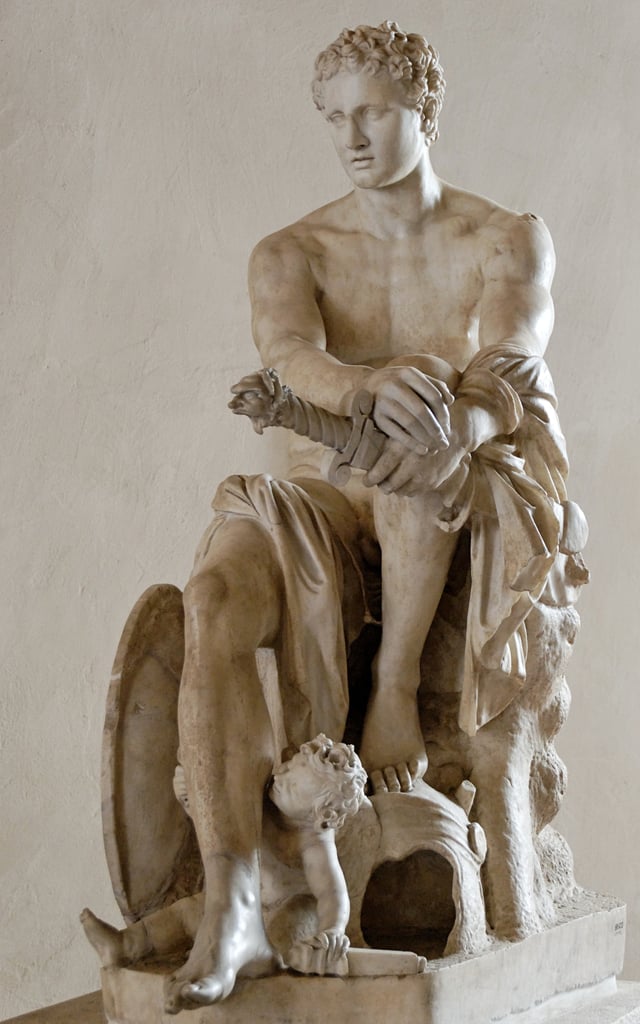
The Ludovisi Ares, Roman version of a Greek original c. 320 BC, with 17th-century restorations by Bernini
One of the roles of Ares was expressed in mainland Greece as the founding myth of Thebes: Ares was the progenitor of the water-dragon slain by Cadmus, for the dragon's teeth were sown into the ground as if a crop and sprang up as the fully armored autochthonic Spartoi. To propitiate Ares, Cadmus took as a bride Harmonia, a daughter of Ares's union with Aphrodite. In this way, Cadmus harmonized all strife and founded the city of Thebes.[64]
Ares and Aphrodite
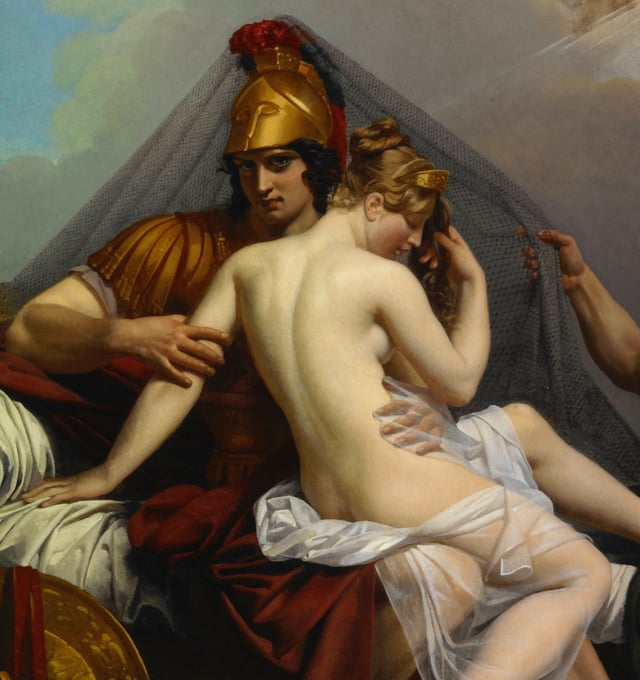
Mars and Venus Surprised by Vulcan (1827) by Alexandre Charles Guillemot (detail)
In the tale sung by the bard in the hall of Alcinous,[65] the Sun-god Helios once spied Ares and Aphrodite enjoying each other secretly in the hall of Hephaestus, her husband. He reported the incident to Hephaestus. Contriving to catch the illicit couple in the act, Hephaestus fashioned a finely-knitted and nearly invisible net with which to snare them. At the appropriate time, this net was sprung, and trapped Ares and Aphrodite locked in very private embrace.[5]
But Hephaestus was not satisfied with his revenge, so he invited the Olympian gods and goddesses to view the unfortunate pair.
For the sake of modesty, the goddesses demurred, but the male gods went to witness the sight.
Some commented on the beauty of Aphrodite, others remarked that they would eagerly trade places with Ares, but all who were present mocked the two.
Once the couple was released, the embarrassed Ares returned to his homeland, Thrace, and Aphrodite went to Paphos.[5]
In a much later interpolated detail, Ares put the young soldier Alectryon by his door to warn them of Helios's arrival as Helios would tell Hephaestus of Aphrodite's infidelity if the two were discovered, but Alectryon fell asleep on guard duty. Helios discovered the two and alerted Hephaestus. The furious Ares turned the sleepy Alectryon into a rooster which now always announces the arrival of the sun in the morning.
Ares and the giants
In one archaic myth, related only in the Iliad by the goddess Dione to her daughter Aphrodite, two chthonic giants, the Aloadae, named Otus and Ephialtes, threw Ares into chains and put him in a bronze urn, where he remained for thirteen months, a lunar year. "And that would have been the end of Ares and his appetite for war, if the beautiful Eriboea, the young giants' stepmother, had not told Hermes what they had done," she related.[66]%205.385%E2%80%93391.]]"In this one suspects a festival of licence which is unleashed in the thirteenth month."[[67]](https://openlibrary.org/search?q=Burkert%20%281985%29.%20 [[CITE|67|https://openlibrary.org/search?q=Burkert%20%281985%29.%20Greek%20Religion.%20p.%C2%A0169.)
Ares was held screaming and howling in the urn until Hermes rescued him, and Artemis tricked the Aloadae into slaying each other. In Nonnus's Dionysiaca[68] Ares also killed Ekhidnades, the giant son of Echidna, and a great enemy of the gods. Scholars have not concluded whether the nameless Ekhidnades ("of Echidna's lineage") was entirely Nonnus's invention or not.
Iliad
In the Iliad,[69] Homer represented Ares as having no fixed allegiances, rewarding courage on both sides: he promised Athena and Hera that he would fight on the side of the Achaeans (Iliad V.830–834, XXI.410–414), but Aphrodite persuaded Ares to side with the Trojans. During the war, Diomedes fought with Hector and saw Ares fighting on the Trojans' side. Diomedes called for his soldiers to fall back slowly (V.590–605).
Athene or Athena, Ares's sister, saw his interference and asked Zeus, his father, for permission to drive Ares away from the battlefield, which Zeus granted (V.711–769).
Hera and Athena encouraged Diomedes to attack Ares (V.780–834).
Diomedes thrust with his spear at Ares, with Athena driving it home, and Ares's cries made Achaeans and Trojans alike tremble (V.855–864).
Ares fled to Mt. Olympus, forcing the Trojans to fall back.
When Hera mentioned to Zeus that Ares's son, Ascalaphus, was killed, Ares overheard and wanted to join the fight on the side of the Achaeans, disregarding Zeus's order that no Olympic god should enter the battle, but Athena stopped him (XV.110–128). Later, when Zeus allowed the gods to fight in the war again (XX.20–29), Ares was the first to act, attacking Athena to avenge himself for his previous injury. Athena overpowered him by striking Ares with a boulder (XXI.391–408).
Renaissance
In Renaissance and Neoclassical works of art, Ares's symbols are a spear and helmet, his animal is a dog, and his bird is the vulture. In literary works of these eras, Ares is replaced by the Roman Mars, a romantic emblem of manly valor rather than the cruel and blood-thirsty god of Greek mythology.
In popular culture
See also
Friends and counselors
Themis (Divine law)
Dike (Good judgement)
Attendants
Achlys (Death)
Androktasiai (Slaughter)
Eris (Strife)
Enyo (Violence)
Homados (Battle din)
Hysminai (Combat)
Keres (Death spirits)
Palioxis (Backrush)
Proioxis (Onrush)
Similar deities in non-Greek cultures
List of war deities
